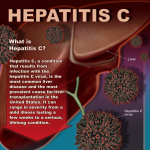 Over the past few years, enormous strides have been made in treatment options for people living with hepatitis C, a form of viral hepatitis that causes chronic liver disease. Treatments in the past were difficult to tolerate, produced numerous side effects, and for a large percentage of patients, were often unsuccessful. Promising new drugs, however, will likely reduce the burden of treatment (the work patients do to care for themselves, such as visiting the doctor or going for medical tests), produce quicker results, and cause fewer and less profound side effects.
Over the past few years, enormous strides have been made in treatment options for people living with hepatitis C, a form of viral hepatitis that causes chronic liver disease. Treatments in the past were difficult to tolerate, produced numerous side effects, and for a large percentage of patients, were often unsuccessful. Promising new drugs, however, will likely reduce the burden of treatment (the work patients do to care for themselves, such as visiting the doctor or going for medical tests), produce quicker results, and cause fewer and less profound side effects.
The Disease
The hepatitis C virus (HCV) is usually transmitted through infected blood, but can also be spread by having unprotected sex. The World Health Organization estimates that 130-150 million people worldwide are living with HCV, and according to the Centers for Disease Control and Prevention, approximately 3.2 million Americans have chronic HCV infection.
For many people, HCV produces no symptoms and can go unnoticed for many years. Even if someone is asymptomatic (showing no symptoms), he or she can still transmit the virus to others. Left untreated, HCV can cause chronic liver disease and cirrhosis (scarring of the liver). These liver problems, in turn, can significantly affect other aspects of a person’s health.
Treatment Options
In the past, the go-to medication for physicians treating patients with HCV was pegylated interferon together with ribavirin, or combination antiviral therapy. This therapy was administered in the hopes of achieving a sustained virologic response (SVR), essentially pushing the amount of virus in a person’s body to undetectable levels, thereby limiting further damage to the liver and improving health outcomes.
Most often, treatment was reserved for severe cases involving the patients who were most likely to develop cirrhosis, met other laboratory criteria via blood tests, and were likely to adhere to treatment requirements. Another consideration was the genetic type of the virus, or genotype, as some genotypes are more easily treated than others. The interferon-based therapy had numerous and sometimes intense side effects, was administered from 6 months to one year, and sometimes did not even work for certain patients after treatment had ended.
The past few years have introduced protease inhibitors, drugs designed to prevent the virus from multiplying. Telapravir and bocepravir were taken orally in combination with interferon and ribavirin, a treatment known as triple therapy. While these drugs resulted in improved success rates, they also, according to many sources, were underutilized by providers and still required the use of pegylated interferon and ribavirin.
The newest treatment developments include using drugs like simepravir and sofosbuvir to reach SVR, often without the need for interferon or ribavirin. Most recently, the U.S. Food and Drug Administration approved the single-tablet regimen of ledipasvir/sofosbuvir, which also does not require pegylated interferon or ribavirin. The hope is that this combination pill will allow patients to reach SVR sooner and with fewer side effects along the way. There is much enthusiasm behind this new drug treatment, accompanied by strong worries about its access and affordability, as one complete treatment to achieve SVR could reach nearly $100,000 per patient.
Getting Tested and Treated
The New York State Department of Health (NYSDOH) offers numerous resources for individuals who would like to be screened for HCV either via a rapid test (similar to rapid HIV testing) or through more traditional laboratory techniques. People who have a confirmed HCV infection and would like to learn about their treatment options and get connected to care can do so at the NYSDOH website. Speaking with your current doctor is also a good way to obtain a referral to a provider specializing in HCV treatments.
As with any medical screening, be prepared for positive or negative results and be familiar with follow-up activities, which might include meeting with a physician, answering questions about alcohol use and drug history, and medical monitoring. Getting screened and knowing your HCV status can also help you make lifestyle changes that could improve your health and prolong the time before you need to explore treatment. These growing options for HCV treatment have made it easier for providers and patients to collaborate and achieve the healthiest and most promising results.
To find an excellent doctor who is right for you, please call our Physician Referral Service at 866.804.1007.
